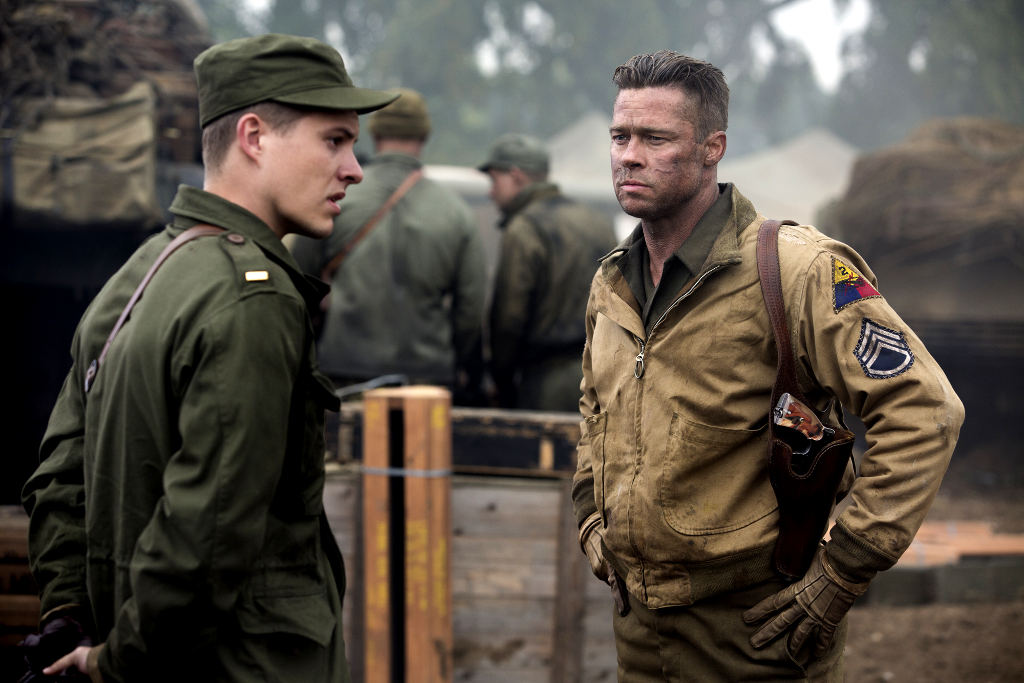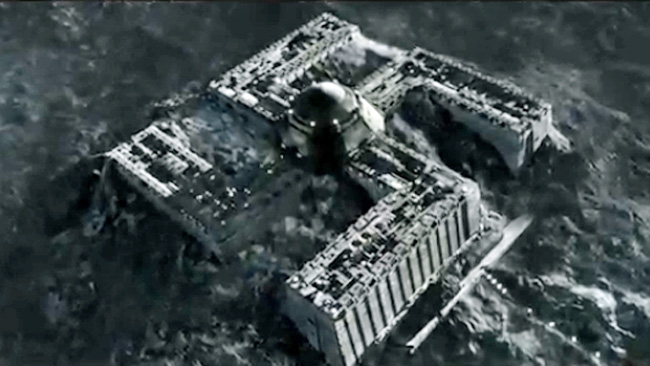Why Is Hollywood Still Obsessed With World War II?
'Fury' is just one more in a long, long line.

This week sees the cinema release of Fury, a rollicking feel-good tale about the liberation of Europe from under the jackboot of Nazi Germany, by a rag-tag American tank crew who spend their spare time shooting unarmed prisoners and sexually harassing women. It’s not to be confused with Monuments Men, a rollicking feel-good tale that came out earlier this year, about a rag-tag bunch of art historians and museum creators who liberated Europe’s art treasures from under the jackboot of Nazi Germany. Or with any of the dozens of other English-language films about World War II, from U-571 to Charlotte Grey to Hart’s War to Defiance to The Reader to Valkyrie to Inglourious Basterds – and they’re just ones made in the 21st century.
Remember the Vietnam War? Hollywood doesn’t; the last major film about Vietnam was 2002’s We Were Soldiers. The last American film that even mentioned the Korean War (1950-53) was 2003’s Big Fish. And while America was fighting two separate wars in the Middle East until just a few years ago, the trickle of films about those wars has already dried.
But fighting Nazis? World War II ended sixty-nine years ago, and even after all those years Hollywood just can’t get enough.

Not the official opinion of the Hollywood Chamber of Commerce.
So what is it that makes World War II – and more specifically, the Nazi-led German forces – so irresistible to Hollywood? The Nazis were defeated once and for all a lifetime ago; at a time when Hollywood is supposedly only interested in making movies aimed at people born after 1990, why keep digging up Hitler?
–
#1: World War II is the only war the USA has won
It’s easy to forget that out of all the many, many wars fought by the United States, World War II is pretty much the only one where they won a clear-cut victory. World War I? They only showed up towards the end. The Korean War? North Korea still seems to be hanging in there. They lost in Vietnam; every time Reagan invaded a country it just seemed like beating up on little kids; the Soviet Union collapsed peacefully; both Gulf Wars didn’t exactly end up as promised; and Afghanistan is no-one’s idea of a holiday destination.
So if you’re looking for a feel-good war story, it’s World War II or nothing. And at a time when we’re told that the West is surrounded by evil forces that we can’t quite seem to defeat, looking back to a time when evil really was defeated certainly has its appeal.
–
#2: World War II involved plenty of cool toys
Every war before World War II either involves guys sitting in holes in the ground, or lame old-timey guns that fire one shot at a time. Not to mention a lack of planes, tanks, napalm, atomic bombs, guided missiles, helicopters and, possibly, Nazi moon bases.
Bor-ring.
And every war after World War II (with the possible exception of Korea) wasn’t a fair fight. There’s no point having loads of cool equipment if the other guy is just sneaking around fighting you from the shadows. So if you want to make a war movie with big, in-your-face battles involving loads of (relatively) high-tech equipment, World War II remains your only choice.
–
#3: World War II moves with the times
While the basic outlines of World War II are known to pretty much everyone – it went from 1939 to 1945, it involved the Allies vs Axis, Hitler only had one ball – it was such a huge conflict that it’s possible even now to find angles on it that reflect how we live today.
Movies about Vietnam pretty much have to be about how war is a senseless incoherent waste; movies about the Gulf War tend to be about the dodgy political forces behind the war. But World War II can easily encompass films like the ’50s stiff-upper lip classic, The Dam Busters:
’60s hippie freak-out Kelly’s Heroes:
And 2014’s Fury, where a brave and noble warrior rides a white horse… and then Brad Pitt stabs him in the eye and steals his ride.
–
#4: Nazis are Hollywood’s dream bad guys…
If the Nazis didn’t exist, Hollywood would have had to invent them. They’re white, they’re European, they did a lot of amazingly evil stuff that no-one in their right mind is going to defend, and they go around wearing black uniforms with skulls on them (designed by Hugo Boss, no less): they’re the perfect bad guys.
And because they were so bad, no-one’s going to complain when Hollywood shows movie Nazis doing stuff they didn’t do: In Monuments Men, George Clooney’s character mentions the Italian Monastery of Monte Cassino as a priceless treasure destroyed by the Nazis. One problem: Monte Cassino was actually destroyed by Allied bombing, and it was German officers who had the art that was stored there removed at the start of the battle, and shipped to the Vatican for safekeeping — though it’s possible a few trucks found their way to Herman Goering’s personal collection along the way.
–
#5: …And no-one’s going to stick up for them.
Perhaps most importantly though, the Nazis lost the war. In fact, they were pretty much the biggest losers in the history of war itself. There are no National Socialist governments anywhere in the world today, and no-one aside from crazy fringe groups has a single good word to say about Adolph Hitler or the Nazi Party. The US might have waged a Cold War against the Soviet Union for 40 years, but Russia is still a valuable market (and one that looks favourably on its Communist past); China is a huge and growing movie market and they’re still 100% commie. If North Korea let Hollywood in, you can bet the number of movies where they’re the crazy bad guys would drop off in a hurry. That makes World War II – the Nazi part at least – the only war where Hollywood doesn’t have to worry about offending someone.
While Nazi Germany was just bad to the bone, Japan, the “forgotten” bad guys of World War II, get a much more nuanced examination. Clint Eastwood made Flags of Our Fathers about the American assault on Japanese forces on Iwo Jima, then turned around and made Letters From Iwo Jima, which told the same story (sympathetically) from the Japanese side. Even Michael Bay’s Pearl Harbor has scenes explaining why the Japanese made a surprise attack on American soil.
–
Hollywood keeps re-fighting World War II because in the Nazis they have found the ultimate inhuman evil, a demonic force that has nothing to do with humanity — and they wear cool uniforms so we know to kill them on sight. Hollywood’s always going to need bad guys for the good guys to shoot down (2014 is not a good time to be a Russian mobster, for instance; in The Equalizer and John Wick, we watch them drop like flies). But using Nazis as two dimensional villains — with WW II as some kind of exploding backdrop — turns them into little more than cartoonish baddies.
–

